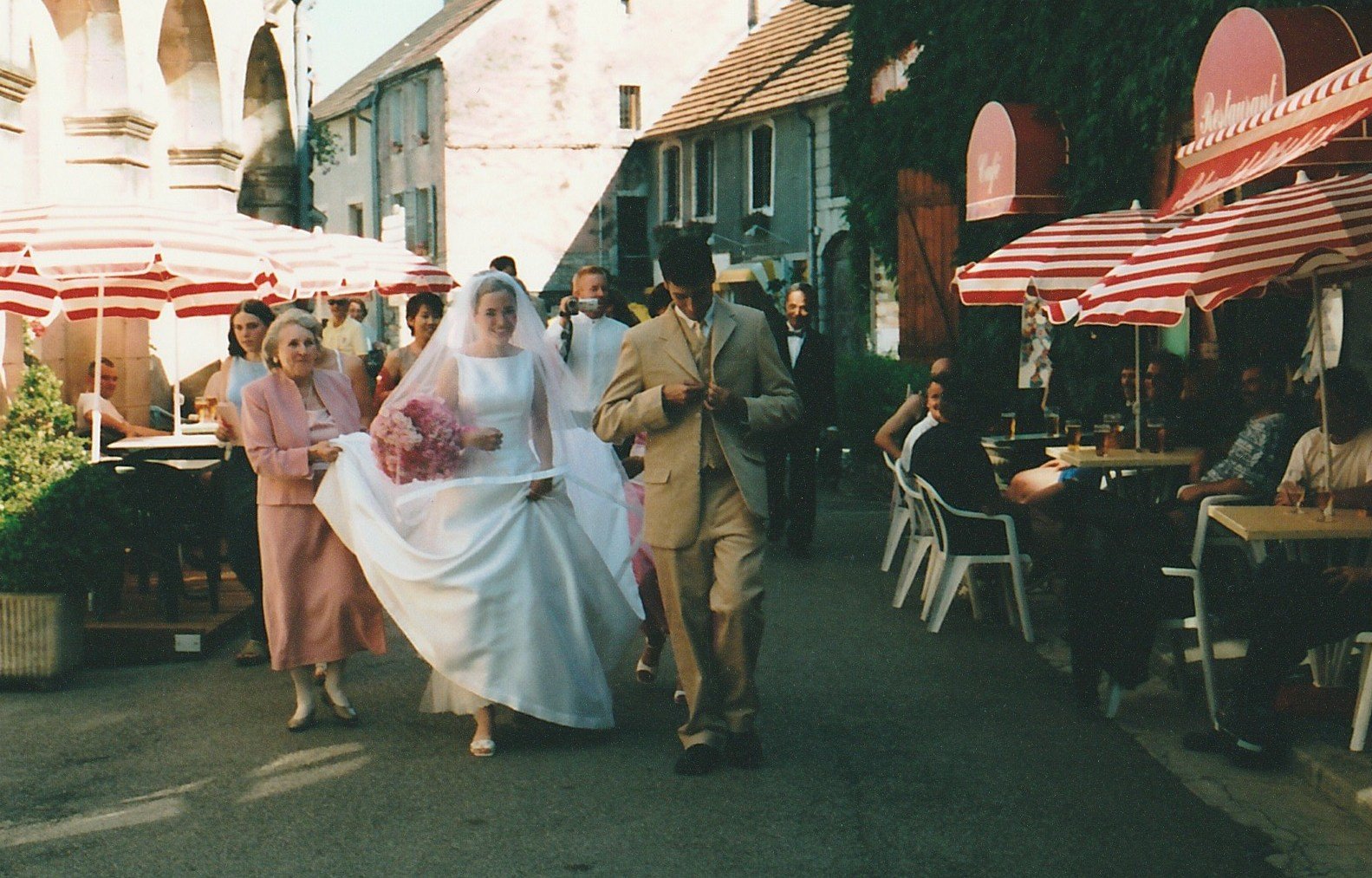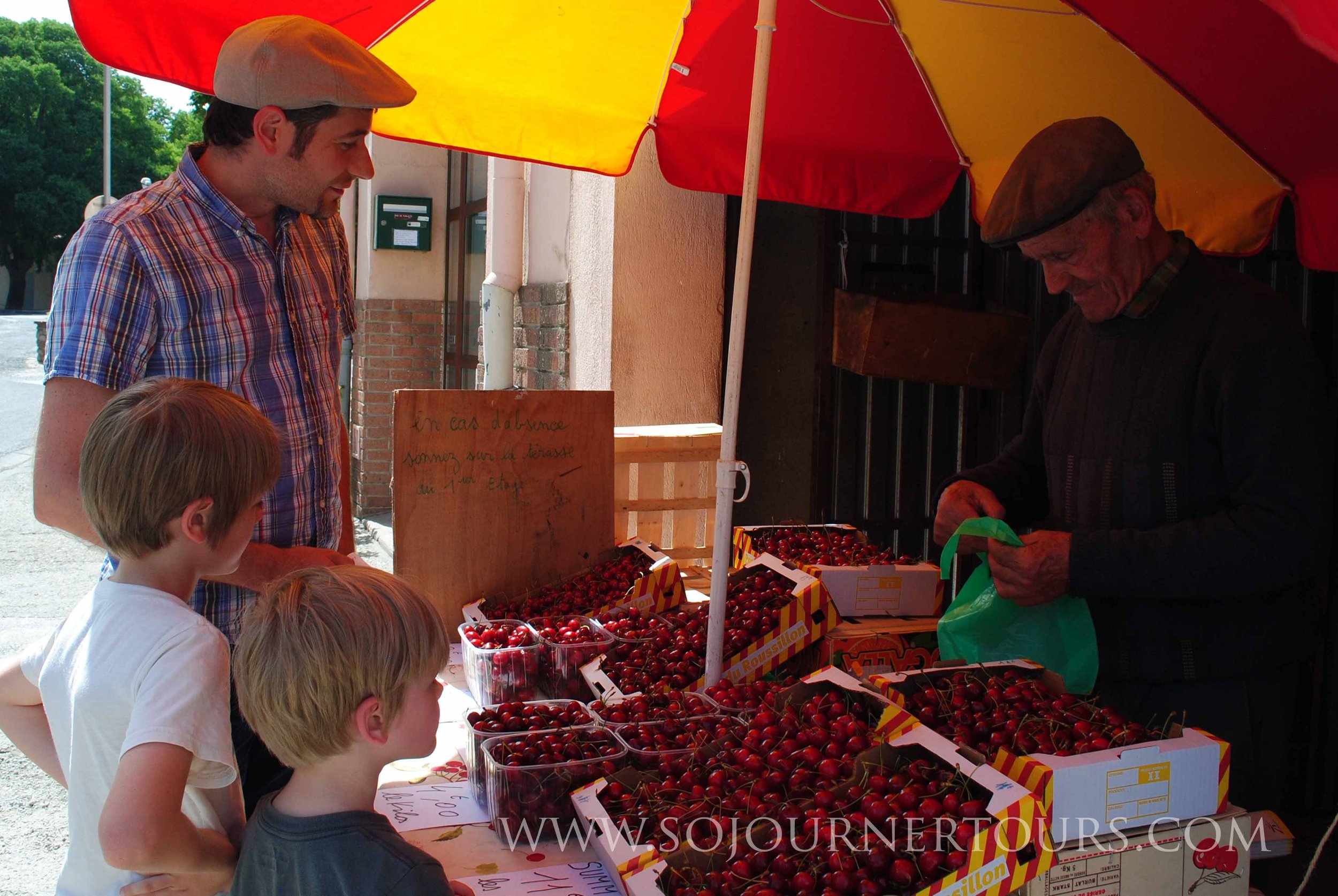SOMETIMES WE FEEL EMPTy But it isn’t hunger… the French Food Culture helps fill that void.
Sojourners sharing a meal in a Parisian restaurant.
Sojourners sharing a homecooked Live-Like-a-Local meal in Provence.
RESTORATIVE FRENCH LIFESTYLE Trips For Women
France has a special healing power that comes from the French commitment to perpetuate their ancestral connection to the earth. Sure, many people associate the French with highbrow culture, luxury, the arts, philosophy, beauty… and, they aren’t wrong! But, France also has a cultural spirituality grounded in the land, the people who work the land and the consumption of products of the earth —and that is foundation for the French lifestyle. A lifestyle that places significance on food, agriculture, viticulture, artisanal products and cooking as the magnetic force that draws lone individuals into social communities and grounds lost hearts with a personal connection to the earth. Food rituals draw people together around the table to slow down and connect but even when practiced alone, the French-style of eating is a way to practice living in the moment and feeling connected to your local community, the seasons and nature. This food culture unites France with the other Latin countries of Mediterranean: Spain and Italy. The magical healing power of food in the Romance countries healed the heart of author Frances Mayes and inspired her to write Under the Tuscan Sun and inspired Lisa Gustavson to start Sojourner tours.
French-Swiss Borderland Sojourn
Sojourner celebrating a birthday with guide Lisa
Guide Francis buying goat cheese at market
Live-Like-a-Local, Provence
HOW SOJO UNDERSTANDS YOUR EMPTINESS
From the time she was a young girl, there was a void in Lisa’s heart that turned her into a life-long searcher on a quest for the love that would fill the hole within her. As a young girl, she adored her father who ushered her into the world with a belief that every creature has value by teaching her not to kill spiders in the house but to gently transport them outdoors. In his sophomore year at Harvard, a mental breakdown left him permanently disabled so he stayed at home writing poetry and watching over Lisa. The weight of his disability led Lisa’s parents to divorce when she was five. Lisa’s mother was a striking woman who’d done a little modeling before becoming a nurse; she loved to sew and decorate the humble Appalachian home where she raised Lisa. When Lisa was fifteen, her mother’s tremendous strength as a working single mother gave way to illness and hospitalization, she lost her mother much like her father. Lisa was taken in by her father’s brother and his French-Algerian wife. In their bi-lingual bi-cultural home, Lisa began to pick up the linguistic skills and cultural practices that would eventually lead her to spend a junior year abroad in France where she met her French husband who became the doorman who ushered her into the French life. Losing both parents left Lisa wanting for community and groundedness —she was adrift in the world feeling alone, different, unseen or misunderstood even in the presence of others, even in a romantic partnership… and the French lifestyle offered her a way to heal part of that ungroundedness through food rituals and practices.
Lisa came to see the wellness powers of the French food philosophy as a departure from the American fuel-the-body “health food” concept that focuses on WHAT you eat —grab a power shake, eat things because they are “good for you” even if you don’t like the taste, pop a vitamin. Through her French family, Lisa came to understand that in addition to the fact that WHAT goes in your mouth sustains your body, there are other aspects of eating that impact our mental health and general well-being: HOW you eat, WHERE you eat, WHEN you eat, and WHO you eat with enables you to nourish your heart, soul and self-esteem.
Lisa marrying Francis in his grandmother’s village. 2002
HOW ADOPTING A FRENCH PHILOSOPHY filLS heartS
Lisa was indoctrinated into the French food philosophy and food practices during the summers she spent with her in-laws. Then, the year that the Fukushima Nuclear Accident led her to take refuge with her husband’s cousins in the countryside she seized the opportunity to immerse herself in mastering this French way of being as part of the process of healing some of the pain, rooted in childhood, which had been brought back to the surface by the recent trauma she’d lived through.
The French have such a special philosophy of food that UNESCO recognizes the French gastronomic meal as part of the world’s Intangible Cultural Heritage. If you’ve read Mirille Guiliano’s French Women Don’t Get Fat you understand that one of the distinguishing features is a focus on pleasure: the goal of a French meal isn’t to feel “full” but rather satisfied. Quality is more important than quantity and French people would prefer to pay more to get less if it means obtaining something better. When you have less, you eat slower and savor it more… engaging all your senses to take in the visual… the aromatic… the textural… the flavor of what you are eating. Basically, in France, less is more!
What “better” means is subjective, but the French generally agree that when food is local, traditional, artisanal… that scarcity and uniqueness lend value making something a precious treasure. This value is one way of defining terroir which leads the French government to reinforce the value of local, handmade foods through a positive A.O.C. labeling system that promotes the prioritization of purchasing non-industrial foods. Rowan Jacobsen beautifully explains the concept in the introduction to his book American Terroir concluding, “Paying attention to terroir is one of the best and most enjoyable ways to reestablish [our] relationship [with the earth and the rural people who nurture the land]. It can teach us about who we are, why we like what we like and how we go about living on the earth. It can allow us to rediscover a romance that is exhilarating, fortifying and real.” Michelin star chefs are both artists as well as ambassadors of local farmers and this food philosophy -so, eating in a Michelin starred restaurant is an opportunity to experience love: love of the earth, love of the local farmers, love of the local artisans and love of yourself which is why Lisa includes dining in one on every sojourn itinerary.
French food did not undo what Lisa had lost when she was taken from her parents and placed in the home of her aunt and uncle… or what she lost when she fled the Fukushima Incident with her husband and young sons. French food culture provided Lisa with a healing tool in the form of an emotional anchor she could use to feel moored and connected to the local community and nature wherever she traveled. Such an anchor alleviates some of the stress of feeling alone in the world, feeling lost, feeling purposeless. Systemic work needs to be done to get to the source of those feelings and repair them, but having an emotional anchor is a tremendous boost to those of us who don’t have the safety net of family, the connection of a life-long romantic partner, the security of a career, etc… For Lisa, gaining the tool of the French Food Philosophy was meant no longer was she lonely even if traveling alone -no longer when dining by herself did she need to escape into the company of a book, newspaper, or social media… now with every bite she was able to feel connected to nature, the local culture, and the community of farmers and chefs who’s work was nourishing her. The French food philosophy undoes some of the individual damage we suffer as part of the cultural legacy of the Industrial Revolution and brings us back into alignment with nature and our-selves which softens inner emptiness until we’ve worked through the shame, guilt, abandonment and other issues making us feel so lonely and hollow.
Some emotionally anchoring experiences you’ll have during sojourns can be replicated when you return home:
1. Get in touch with the seasons, your environment and the farmers in your community by eating close to the earth -grow and harvest unprocessed foods yourself -even if it’s just a couple of herbs or planting a fruit tree in your yard so you feel in touch with the seasons and nature. Expand your community and your role in it by shopping regularly at a farmer’s market to experience the warm interdependence of supporting the person who grows the food that sustains you. When shopping at the grocery store, get a list of what’s in season (often it will be the produce that is plentiful and on sale) and shop according to the time of year, so each year you can look forward to seasonal favorites. If you are in a food desert then shift your focus to your recipes: most dollar stores will have some basic baking ingredients —can you scratch together grandma’s cake or cookie recipe so you enjoy that tie to the past?
2. Expand your reciprocal relationships within the community by eating close to home -make it yourself if you can, if you can’t then become a regular at an artisanal co-op or specialized boutique like a bakery where your face will become familiar as an appreciated supporter to the person who makes the food that sustains you. Find a friend who wants to participate in a food exchange -I’ll make a big batch of soup and share half with you if you make me a loaf of bread the next time you bake one for yourself. Suggest a neighborhood potluck, have a friend over for dinner.
3. Prioritize quality over quantity.
4. Savor each bite with every sense.
5. Treat meals as a ritual with a set time, place and procedure so you can anticipate, enjoy and reflect upon what you eat with joy.
A sojourner in Provence shopping in the markets for her contribution to the group “potluck” picnic with the assistance of guide Francis.
A LOOK AT Lisa’s FRENCH FAmily FOOD PRACTICES…
Lisa’s Boys Picking Fruit
The Tarts, Jam, Liqueur & Sorbet Lisa Made with the Raspberries, Cherries and Currents they Picked
Lisa’s Boys (big and little ;) Shopping Locally from a Rural Farmer & Village Baker
Enjoying an Aperitif at Papie’s Place before a Meal with Auntie, Uncle and Cousin
Eating a Gastronomic Meal at Great Auntie & Uncle’s Home
Leisure Time after Meals with our French Family and Friends
Playing Petanque, Lounging by the Pool, Strolling in the Countryside





















